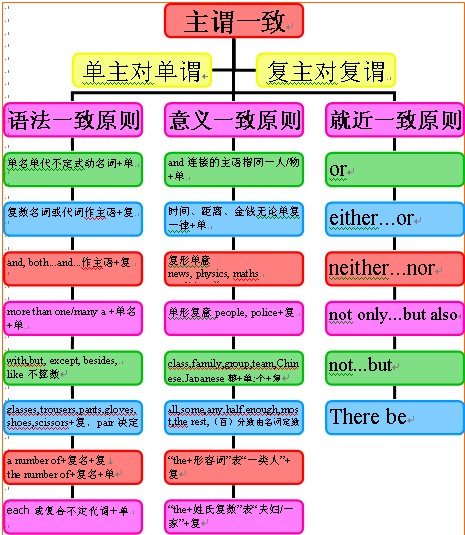本试题 “The majority of the students in our class ________ satisfied with the condition.[ ]A. wereB. wasC. had beenD. has been” 主要考查您对一般过去时
主谓一致
等考点的理解。关于这些考点您可以点击下面的选项卡查看详细档案。
- 一般过去时
- 主谓一致
一般过去时的概念:
一般过去时表示过去某个时间里发生的动作或状态;过去习惯性、经常性的动作、行为;过去主语所具备的能力和性格。
一般过去时的用法:
1、表示过去发生的动作或存在的状态,常与表示过去时间的副词如:yesterday,last week,two hours ago等连用。
如:My family moved here five years ago. 我家五年前搬到了这里。
I was born in 1973. 我生于1973年。
2、表示过去一段时间经常或反复发生的动作。这时可与频度副词如:often,usually,always等连用。
如:He always worked in tonight those days. 那些日子他总是工作到深夜。
I often left on business in 1987. 1987年我经常出差。
注:表示“过去经常,而今不再”时,要用usedto.
如:I used to read newspaper after breakfast. 我过去经常早饭后看报纸。(意指现在已不是这样)
The children often swam in this river. 孩子们过去经常在这条河里游泳。
3、表示过去发生的一连串动作。
如:He put down the heavy box, took out the keys, and opened the door. 他放下这沉重的箱子,掏出钥匙开了房门。
注:过去发生的一连串动作,若用and,or,but等并列连词连接,则一律用过去式。
如:They moved the chairs to the table, sat down and began to have supper. 他们把椅子搬到桌边,坐下开始吃饭。
4、在时间和条件状语从句中,用一般过去时表示过去将来的动作。
如:He said that he would let me know as soon as he got the information. 他说他一得到消息就立即让我知道。
Mary told me that she would stay at home if it rained. 玛丽告诉我如果下雨她就呆在家里。
一般过去时的特别用法:
1、句型:It is time for sb. to do sth "到……时间了" "该……了"。
例如:It is time for you to go to bed.你该睡觉了。
It is time that sb.did sth. "时间已迟了" "早该……了"。
例如:It is time you went to bed. 你早该睡觉了。
2、would(had)rather sb.did sth. 表示'宁愿某人做某事'。
例如:I'd rather you came tomorrow. 还是明天来吧。
3、wish, wonder, think, hope等用过去时,作试探性的询问、请求、建议等,而一般过去时表示的动作或状态都已成为过去,现已不复存在。
例如:I thought you might have some. 我以为你想要一些。
比较:Christine was an invalid all her life.(含义:她已不在人间。)
Christine has been an invalid all her life.(含义:她现在还活着)
Mrs. Darby lived in Kentucky for seven years.(含义:达比太太已不再住在肯塔基州。)
Mrs. Darby has lived in Kentucky for seven years.(含义:现在还住在肯塔基州,有可能指刚离去)
注意:用过去时表示现在,表示委婉语气。
1)动词want, hope, wonder, think, intend等。
例如:Did you want any thing else? 您还要些什么吗?
I wondered if you could help me. 能不能帮我一下。
2)情态动词could, would。
例如:Could you lend me your bike? 你的自行车,能借用一些吗?
主谓一致的概念:
谓语的数必须和主语的人称和数保持一致,这就叫主谓一致。
主谓一致的基本原则:
1)语法一致原则,即在语法形式上取得一致。例如,主语是单数形式,谓语动词也采取单数形式;主语是复数形式,谓语动词也采取复数形式。
例如:The students are very young.
This picture looks beautiful.
2)意义一致原则,即从意义着眼处理一致关系。例如,主语形式虽是单数但意义是复数,谓语动词也采取复数形式;
而有些主语形式虽是复数但意义上看作单数,谓语动词也采取单数形式。
例如:The people in that country are fighting for independence.
The crowd deeply respect their leader.
Three years in a strange land seems a long time.
3)就近原则,即谓语动词的单数或复数形式取决于最靠近它的词语。
例如:Neither hen or I am going to see the film tonight because we are busy.
几对容易混淆词组的一致用法:
1、由“this/thatkind/typeof+名词”作主语,谓语动词用单数形式;而由"these/thosekind/typeof+复数名词”作主语,谓语动词用复数形式。
例如:This kind of apples is highly priced.
Those kind(s) of tests are good.
2、由“a number of,a totalo f,an average of+复数名词”作主语,谓语动词用复数形式;由“the number of,the total of,the average of+复数名词”作主语,谓语动词用单数形式。
例如:A number of students are waiting for the bus.
The number of the students in this university is increasing yearly.
3、one of,the(only) one of的一致用法
例如:This is one of the books that have been recommended.
This is the(only) one of the books that has been recommended.
主谓一致用法点拨:
1、并列结构作主语谓语用复数:
如:Reading and writing are very important.
注意:当主语由and连结时,如果它表示一个单一的概念,即指同一人或同一物时,谓语动词用单数,and此时连接的两个词前只有一个冠词。
如:The iron and steel industry is very important to our life.
典型例题:
The League secretary and monitor___asked to make a speech at the meeting.
A. is
B. was
C. are
D. were
答案:B.
注:先从时态上考虑。这是过去发生的事情应用过去时,先排除A、C本题易误选D,因为The League secretary and monitor 好象是两个人,但仔细辨别,monitor前没有the,在英语中,当一人兼数职时只在第一个职务前加定冠词。后面的职务用and相连。这样本题主语为一个人,所以应选B。
2、主谓一致中的靠近原则:
1)当there be句型的主语是一系列事物时,谓语应与最邻近的主语保持一致。
例如:There is a pen, a knife and several books on the desk.
There are twenty boy-students and twenty-three girl-students in the class.
2)当either…or…与neither…nor,连接两个主语时,谓语动词与最邻近的主语保持一致。
如果句子是由here, there引导,而主语又不止一个时,谓语通常也和最邻近的主语一致。
例如:Either you or she is to go.
Here is a pen, a few envelops and some paper for you.
3、谓语动词与前面的主语一致:
当主语后面跟有with, together with, like, except, but, no less than, as well as等词引起的短语时,谓语动词与前面的主语一致。
例如:The teacher together with some students is visiting the factory.
He as well as I wants to go boating.
4、谓语需用单数:
1)代词each和由every, some, no, any等构成的复合代词作主语,或主语中含有each,every,谓语需用单数。
例如:Each of us has a tape-recorder.
2)当主语是一本书或一条格言时,谓语动词常用单数。
例如:The Arabian Night is a book known to lovers of English.
3)表示金钱,时间,价格或度量衡的复合名词作主语时,通常把这些名词看作一个整体,谓语一般用单数。(用复数也可,意思不变。)
例如:Three weeks was allowed for making the necessary preparations.
Ten yuan is enough.
5、指代意义决定谓语的单复数:
1)在代词what, which, who, none, some, any, more, most, all等词的单复数由其指代的词的单复数决定。
例如:All is right. (一切顺利。)
All are present. (所有人都到齐了。)
2)集体名词作主语时,谓语的数要根据主语的意思来决定。
例如:family, audience, crew, crowd, class, company, committee等词后用复数形式时,意为这个集体中的各个成员,用单数时表示该个集体。
例如:His family isn't very large. 他家不是一个大家庭。
His family are music lovers. 他的家人都是音乐爱好者。
但集合名词people, police, cattle, poultry等在任何情况下都用复数形式。
例如:Are there any police around?
3)有些名词,如variety, number, population, proportion, majority等有时看作单数,有时看作复数。
A number of+名词复数+复数动词。 The number of+名词复数+单数动词。
例如:A number of books have lent out.
The majority of the students like English.
6、与后接名词或代词保持一致:
1)用half of, part of, most of, a portion of等词引起主语时,动词通常与of后面的名词,代词保持一致。
例如:Most of his money is spent on books.
Most of the students are taking an active part in sports.
2)在一些短语,如many a或more than one所修饰的词作主语时,谓语动词多用单数形式。
但由more than…of作主语时,动词应与其后的名词或代词保持一致。
例如:Many a person has read the novel. 许多人都读过这本书。
More than 60percent of the students are from the city. 百分之六十多的学生都来自这个城市
主谓一致知识体系:

主谓一致用法拓展:
1)当everyone,everybody,noone,nobody,anyone,anybody,someone,somebody,everything,anything,something,nothing等用作主语时,其相应的代词一般用单数形式。
例如:If anybody calls, tell him that I'm out.
Something strange happened, didn't it?
2)人称代词与名词的呼应:人称代词I(me),he(him),she(her),it(it) 都是代替前面的单数名词,而they(them),we(us)则是代替复数名词的,you既可以代表单数,也可以代表复数。但表示泛指的时候,用he或one来表示。
例如:If a young person enters a classical music field only for money, he is in the wrong profession.
3)物主代词与名词的呼应:my,our,his,her,its,their要与代替的名词在数上一致。
例如:The welfare department,as well as the other social services,will have its budget cut.
4)反身代词与其所代成分间的呼应。
例如:Many primitive people believed that by eating ananimal they could get some of the good qualities of that animal for themselves.
5)指示代词与所代名词间的呼应:this和that指代单数名词或不可数名词,these和those指代复数名词(those还可以用作先行词,引导定语从句,表示“那些人”)。
例如:She invited all those who had been her former colleagues.
6)much和muchof后接不可数名词,而many和manyof后接可数名词的复数。
例如:There is not much coal left.
A great many of the houses were knocked down by the earthquake.
7)表示量的词后面有的接可数名词,有的接不可数名词。
接可数名词的有:a number of,a rangeof,a series of十复数名词;
接不可数名词的有:a great deal of,an amount of十不可数名词;
既可接可数又可接不可数名词的有:a lot of,a variety of。
例如:1.The government attached a great deal of importance to education.
2.Quiteanumberofwomenappliedforthisjob.
3.The college library has avariety of books.
4.An apple is avariety off ruit.
与“The majority of the students in our class ________ satisf...”考查相似的试题有:
- 用declare与announce的正确形式完成句子1. Everyone was silent as he the list.2. The US war on England in 1812.3. The pa...
- Since you weren't at the meeting, we _____ the decision without you.[ ]A. madeB. had madeC. were makingD. would make
- I insisted the file in his computer ______ urgent(紧要的), and it _________ to Mr. Brown without delay.[ ]A. was, to ...
- 短文改错。此题要求改正所给短文中的错误。对标有题号的每一行作出判断;如有错误( 每行只有一个错误) ,则按下列情况改正:此...
- — The food here is nice enough.— My friend _____ me a right place.A. introducesB. introducedC. had introducedD. was i...
- 单词拼写。根据下列句子及所给汉语注释,在句子右边的横线上写出空缺处各单词的正确形式。(每空只写一词)1. When the queen...
- The water cool when I jumped into the pool for morning exercise.[ ]A.was feltB.is feltC.feltD.feels
- —Lydia, what did our head-teacher say just now?—Every boy and every girl as well as the teachers who _____ to lead th...
- The majority of visitors _____ in favor of his conclusion that the number of books published on the subject _____ sim...
- Very few his address in the town. A.knowsB.knowC.are knowingD.has known